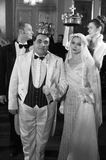
Special Events 2002 / Čechovskije motivy / Russia 2002
Two stories are woven into this film in the spirit of Chekhovian poetics and inspiration. While Peter faces coarse treatment from his despotic father, Tatiana is crushed by a tragic love affair. The intersection of both prompts the question whether sensitive and vulnerable young people have any chance in the face of life’s raw banality.

This film is inspired by the Chekhovian perspective on the human lot and borrows two motifs from his work. The first concerns Peter and his efforts to rid himself of the influence of a despotic father; the second focuses on the tragic affair of young Tatiana. The link between both plots prompts the question whether sensitive and vulnerable young people have any chance of surviving against the banality and barbarity of the world into which they were born. Kira Muratova says of her film: “Film is the production of spectres. When I make a film, I take everything from myself, from everything which truly exists. It’s a rough profession, we’re like surgeons. The result is an illusion created by cruel means... I want each character to have the effect of an emotional snakebite. Unyielding material excites me, it mobilises me, it strikes out. Whatever creates resistance helps me. My soul has an inane disposition: the worse it is, the better! Film, in fact, isn’t particularly useful, it’s a luxury. Like other forms of art. But so what? Why should I do things which are essential to people?”.
110 min / Color, 35 mm
Director Kira Muratova
/ Screenplay Kira Muratova, Jevgenij Golubenko / Yevgeni Golubenko
/ Dir. of Photography Valerij Machněv / Valery Makhnev
/ Music Valentin Silvestrov
/ Editor Valentina Olejnik / Valentina Oleynik
/ Producer Igor Kalenov
/ Production Nikola-Film
/ Cast Sergej Bechtěrov / Sergei Bekhterov, Natalia Buzko / Natalya Buzko, Jan Danhel, Philip Panov

Kira Muratova (b. 1934), after studying philology at Moscow University, graduated in film direction at the VGIK (1961). She lives and works in Odessa. She introduced herself with the previously banned films Short Encounter (1967, Korotkiye vstrechi) and Long Accompaniment (1971, Dolgiye provody). (1971). Her films Getting to Know Real Life (1979, Poznavaya byely svyet) and Among the Grey Stones (1983, Sredi serykh kamnyey) were also regarded with hostility by the regime. These were followed by the aesthetically refined Change of Fate (1984, Peremena uchasti) and the award-winning Asten Syndrome (1991, Astenichesky sindrom). Other films are typical of her daring observations and unique film idiom: The Delicate Militia Man (1992, Chuvstityelny militsionyer), Obsessions (1994, Uvlecheniya), Three Stories (1997, Tri istoriyi), the short film Letter to America (2000, Pismo v Ameriku) and Second-Rate People (2001, Vtorostyepyenniye lyudi). She also develops her unique poeticism in the film Chekhovian Motifs (2002).
First-hand brews throughout the year.
Be among the first to learn about upcoming events and other news. We only send the newsletter when we have something to say.